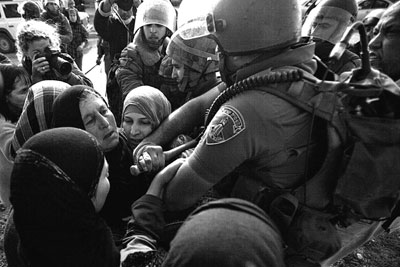
We arrive in the morning, in one of the many luxurious camps built for the comfort of more than six thousand Palestinian prisoners currently detained by Israel. The area includes a large fenced in prison and a military tribunal in which Palestinian prisoners, young and old, are tried by Israeli military officers.
Here there is no racism and there is no discrimination, because everyone, without exception, is entitled to an unfair trial. At the entrance of the military tribunal there are two cages, a small one for those coming from the Israeli side and a larger one where it remains pending with the families of Palestinian prisoners. Some of them have faced a long and expensive journey to get here and meet their loved ones, even for a few minutes.
We get to the big iron gate that stands between us and the beginning of unpleasant security checks. Like the rest of what happens in the day, even the long wait before entering is a well planned game between the visitors and guards, who, despite having a clear list with the names of visitors, do everything they can to pull in long and humiliate the relatives of those arrested. Some guard knows how to speak Arabic, but most gets along with a few basic sentences: "Come here," "go away", "document", "your name" in addition to several commands that you enjoy to give to show the hierarchy imposed by the occupation at any time. The rules are simple: you have to beg and I'll decide when I go to get you through.
Soon after our arrival we saw Abu Hanni and his wife Im Fathi came to meet us from the Palestinian side. Abu Hanni, a man who goes to the seventies, he was born in Jaffa in 1945, one approaches directly with his staff. The long years under the occupation have made him cynical and sarcastic towards the environment: this old has lost three of its sons fighting with the Israeli army and is now waiting for the trial of his younger brother, Fathi.
We are also here to meet Jaudat Fathi and his friend, both arrested a month ago, late at night in their village of Qarawat Bani-Zeid. They were taken by the army during a massive military operation that led to a wave of arrests, intended to crush the popular resistance in the villages of An Nabi-Salih, Qarawat, Beit Rimma and Kufer Ein. The resistance has greatly intensified the question of expropriation of agricultural land belonging to the people of Nabi Salih and surrounding villages, on which there is an ancient source used by local farmers. Two years ago, the source had been declared a site of "archaeological interest "and the army denied all access. Instead, the Jewish settlers who live in the nearby settlement of "Halamish" use every day this spring. After many nonviolent actions in an attempt to recover the source, actions that had met a violent reaction of the army and the settlers, the Palestinians have decided to continue with the protest demonstrations in which weekly take to the streets with the aim of getting back their lands, as a symbol of protest against every possible aspect of occupation.
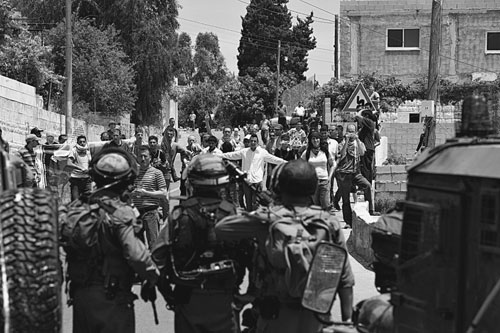
 A bit 'special struggle
A bit 'special struggle
The revolt of the people of the villages has led to large demonstrations involving hundreds of boys and girls, the four surrounding villages and in cooperation with Israeli and international activists. From the outset the demonstrations were characterized by a high level of violence by the army and police, with a massive use of non-lethal weapons: tear gas, rubber bullets and various other things, with the intention of thus suppress the protests, injuring dozens of people. After vain attempts to prevent demonstrations, the Army has changed tactics, focusing on the mass arrests that had as main target the youth.
Fathi and Jaudat are part of a group of over forty women and men arrested following the demonstrations and, as for most of the detainees, their indictment is based on a single charge of throwing stones. For how you keep jobs here, there aren’t specific items about the unfolding of events, but there is a generic description: "... a few times between March and August ..." do not need witnesses or physical evidence and the court martial is only based on investigations which were carried out on the arrested.
Like many of their friends, even our will spend the next months in prison instead of to school, where they were supposed to go by early September, as did the majority of Palestinian prisoners sentenced by a court-martial Israel will know that the justice system's "only democracy in the Middle East."
We knew Fathi several months ago, during the events of Nabi Salih: it was part of one of the large groups of young people Qarawat regular participants in the demonstrations. At first, we had come up with other kids, but soon our relationship had become closer and he was waiting for us at the center of his village and was with us the rest of the way for Nabi Salih, always happy and smiling, even in the most hard that we lived up to the last hours before the arrest, when he has neglected to send us a written message in which he said confidently: "Now is my time and see you again in a few months ..."
The following evening we were on the porch in Jaffa, with depressed faces and away from him. We recalled episodes that we had lived together and sadness oppressing us thinking about all the dear friends who are locked in small windowless cells and can not run in the open air as they like to do. And we thought about Amjad Omar, and to Luay Rassem, thinking about all the shabab and the ways to not allow the enemy to crush the spirit of the great struggle to which we belong and that has become part of us.
It is not the first fight in which we participate, but without doubt is the most special, especially with the amazing variety of people taking to the streets, women, girls form a straight line that bold front of the soldiers and make it clear to them and the men around them that this is their fight, thanks to the boys, girls to young people who know exactly who they are, what they fight for and what they are willing to pay in this battle.
It is a splendid fight for the tenacity, the determination to be such that there is neither we nor withdraw our cause.
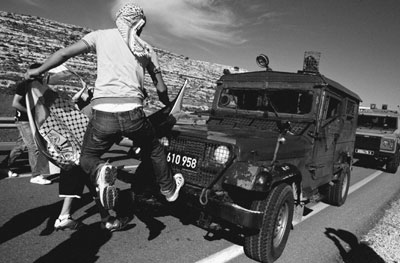
 Vain hope
Vain hope
Fenced area again, finally the iron door opens and the guard lets us pass the security control, every step is followed by our looks and comments only tend to show that we are controlled, which is not allowed to bring anything 'inside, except for cigarettes and money: no water, no book and definitely not a phone. After passing under the shoe X-rays, through the metal detector who does not sound, we are escorted into a small room for the final and humiliating body search.
Now that we have finally overcome all the obstacles of the security system, we enter the large courtyard, under a brilliant August sun, high in the sky, which does not leave even a corner of shadow over their heads, we sit down and hoping to hear called names and Jaudat Fathi, but hope proves futile, because there is no organization or order, the names of the detainees appear on electronic billboards, but with no indication or estimate the time that the hearing be held. As the family arrives at seven-thirty in the morning, often have to wait until late afternoon to attend the hearing for which they came, a hearing which may not even take place. It remains pending, live and waiting to hear a name.
We look forward to entering into the small trailer that serves as a "court", but rather like a military armory. We want to hear the names of our friends, see them smile, but at the same time we would run away from this place so well that represents all the evil, cruelty and repression that surrounds us.
We sit in the yard talking and smiling with parents of Fathi, who did not seem too upset by the situation, after all, they lived almost everything that occupation can give you and now only wish to view their sixteen year old son, who grew up too fast. For many families, these hearings are the only occasions when they can see their loved ones (visits are permitted only after the arrest turned into conviction, with a procedure that can last for months), to ask if they are good to give news of family and village and exchange a few smiles.
Hours go by and the heat does not diminish. About two and a half finally call their names and we hasten to reach the room number 4. There they were, sitting next to us (but so far), wearing those ugly brown suits for the prisoners. Fathi has cut his hair, does not look good, but continues to smile, even if you can read the weariness in his face, Jaudat does not take his eyes off us, even for a moment, then we will know that his family has failed because were not informed of the exact date of the hearing.
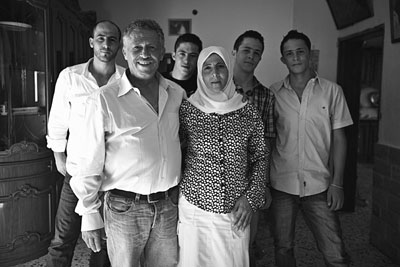
 The repressive system
The repressive system
The man who presides over the court is a high-ranking officer (the title of judge could easily be replaced with that of porter). He's sitting comfortably and watching the show that takes place before his eyes. The prosecutor, a religious young and skinny, who speaks with a strong French accent, is the only one that deals with the situation so seriously. Since neither boy has a lawyer to represent them, the hearing lasted ten minutes, but even in cases where there is a defender (and even if it is an Israeli lawyer) the manner in which the hearing is held far from being rational and fair: the debate is conducted in Hebrew and a soldier acting as interpreter, and of course his duty to translate the prisoners would be the exact words that are spoken, but it really means sometimes a whole sentence, other random words and the rest of the time is still busy making phone calls, flirting with girls in uniform who come to join him and even take a nap. All the while, the debate is "over the head" of prisoners who mostly do not understand anything about the process, unless the charges and dates of subsequent hearings. The court decided to upgrade in two months. Quickly and easily, no doubt, so decided to keep them in prison. No hurry, will still be convicted of a crime they did not commit and the time spent in prison will be subtracted from the sentence that will be handed down against them.
Military courts like to pull in long sentences for those arrested. Those arrested during the demonstrations and charged with stone throwing, in most cases, remain in prison. The procedure is simple: in the first days after the arrest and torture are investigated, which have two purposes, the first is to make them confess their crimes (which they have committed or not), the second is to rip them about their friends in order to fit them as well.
Army investigators, deftly combining the display of muscles and false promises, place young people in front of an easy choice: confess and go from five to eight months in prison or even not to confess and be absolved, but in this case the process can last for years, during which one is waiting in jail.
The combination of fear, torture, false promises and the fact that young people represent the main (if not the only) source of livelihood for their families, prompting many to declare themselves guilty of the charges against them. This way of oppression is not new: it is an integral and important part of the refined system of repression developed by Israel to stifle any expression of popular revolt.
Before Nabi Salih, a similar attack was suffered by the village of Nil'in, culminating with the imprisonment of more than sixty contemporary inhabitants. The repressive system was unable to break the spirit of the inhabitants, even if it has indeed greatly weakened the force of events, hitting the guide elements and young people who chose to resist.
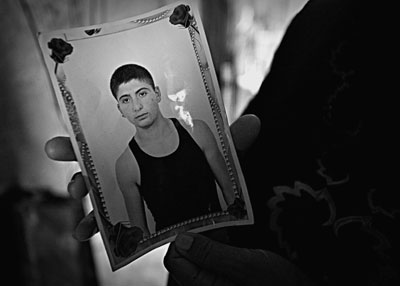
 They chose not to remain silent
They chose not to remain silent
Fathi and Jaudat hearings are over and starts that of the third person sitting next to them, he seems unsure but decided to say something to the court. The judge reluctantly agrees, and he stands up proudly and turns to all people in the room: "My confession was extorted by violence and torture, I do not recognize the existence of the state of Israel, and this process .... " Remains stationary while the soldier translates his words to the judge, who keeps his eyes fixed on him. I look at this young man and my heart beats faster, he returns my eye and I'm like a sign of victory. I admire the strength he has in his heart, what have the others.
The guard ordered to roughly Fathi and his friends to get up, Fathi trying to say one last thing to his mother before being pushed out. Abu Hanni stands, thanking the honorable court, the soldier translates his words but none of these military seems to capture the sarcastic tone with which they were uttered.
Once out of the trailer, we try to shout a few words to our friends who have drifted away on the other side of the fence. Now the only thing that unites us is the sound of metal chains tied between their legs and, within seconds, this will fade in the heat of this quiet and depressing place.
The output path to reach our cars is made in silence, we must stand in a small cage and ask a soldier who can not see, beyond a dark glass, to give us our identity documents, that are essential to move away from this place whe hate and where we will definitely return next week.
The last goodbye to a cage we have and Im Abu Fathi, we kiss and hug, promising to return again and keep in touch, they are emerging from the other side of the cage.
When he finally closed the last gate behind us, when we should feel "free" and "liberated", we remain quietly next to our car, there is nothing that can soothe the soul. We can only think of those who have been taken away the last shred of freedom because they chose not to remain silent.
To help collect funds for political prisoners and jail expenses, contaat the Circolo dei Malfattori, via Torricelli 19, 20141 Milano - malfattori@inventati.org